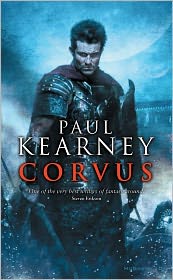
Corvus is the sequel to The Ten Thousand, Kearney's masterful novel describing old-school warfare. Corvus picks up with the same main character Rictus, now a decade older and hoping to retire. A new, brilliant commander has arisen and presses Rictus into service as a general; together, they try to unify the entire people of the Macht.
Like its predecessor, Corvus manages to show us battles writ both large and small. Kearney goes to pains to present a wide campaign, conquering this city and bypassing that, considering entire legions as mere playing pieces in a grand game--some to be retained, some to be sacrificed. But where he really shines is in the intimate details of the spear phalanx, leaving the reader feeling muddied and wounded and pressed on all sides in the grip of othismos--the very marrow of war. These battle scenes are utterly gripping, managing to be both gruesome in detail and yet impersonal in intent as the phalanx presses the leading ranks from behind, lifting the leading elements off their feet such that the men literally walk on the dying bodies of their enemies. Kearney's descriptions show us warfare that is both vicious and uncaring--and he does it in the context of a novel that also carries realistic characters, a rich world setting and a compelling plot.
The one area where Corvus does not manage to match The Ten Thousand is in plot twists. In its predecessor, important characters are suddenly lost and battles shift unexpectedly, emphasizing the unknowable truth of a mercenary's life; in Corvus, the plot arc could be guessed by reading the summary on the back and maybe a few key paragraphs, and it never really deviates from that arc. It's a good arc, to be sure, but it's too predictable to really match The Ten Thousand for intensity.









No comments:
Post a Comment